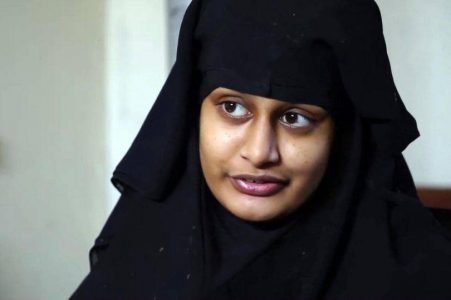
Islamic State bride Shamima Begum loses legal challenge against loss of British citizenship
Former ISIS bride Shamima Begum has lost the first stage of her legal challenge against the decision to revoke her British citizenship.
Ms Begum, now 20, had pleaded to return to the UK after being found, nine months pregnant, in a Syrian refugee camp in February last year.
Former Home Secretary Sajid Javid stripped her of her British citizenship later that month – a decision Ms Begum’s lawyers argued was unlawful as it rendered her stateless.
Ms Begum left the UK in February 2015 and lived under ISIS rule for more than three years.
She was one in a group of three East London schoolgirls who travelled to Syria.
A decision to revoke someone’s citizenship is only legal if that person is entitled to citizenship of another country.
Judge Doron Blum, announcing the decision of the tribunal, said that the move did not breach the Home Office’s “extraterritorial human rights policy by exposing Ms Begum to a real risk of death or inhuman or degrading treatment”.
He added that, while Ms Begum “cannot have an effective appeal in her current circumstances”, it “does not follow that her appeal succeeds” on that ground.
Last year, Ms Begum took legal action against the Home Office at the High Court and the Special Immigration Appeals Commission (SIAC), a specialist tribunal which hears challenges to decisions to remove someone’s British citizenship on national security grounds.
The tribunal, led by SIAC president Mrs Justice Elisabeth Laing, delivered its verdict this morning.
At a hearing in October, Ms Begum’s barrister Tom Hickman QC said the situation in the al-Roj camp in which Ms Begum was then being held was “incredibly fragile and dangerous”, and described conditions at the camp, where Ms Begum’s third child died last March, as “wretched and squalid”.
Mr Hickman argued that Ms Begum – who is of British-Bangladeshi heritage – “is not considered a national of Bangladesh and was therefore rendered stateless by the deprivation decision”.
He also submitted that conditions in al-Roj – and in the al-Hawl camp from which Ms Begum was moved for her own safety in February – breached Ms Begum’s human rights.
Mr Hickman added that the decision “had the effect – and was designed – to prevent” Ms Begum from returning to the UK, leaving her “abandoned” in a detention camp.
This, he added, meant Ms Begum “cannot have a fair and effective appeal” as she is unable to speak confidentially with her lawyers or to give evidence in support of her appeal.
Jonathan Glasson QC, for the Home Office, argued that Ms Begum “was a Bangladeshi citizen by descent, in accordance with Bangladeshi law, and so was not rendered stateless by the deprivation decision”.
He also submitted that Ms Begum “has not been placed at risk of ill-treatment” as a result of the decision to revoke her British citizenship.
“Any risk that the appellant does face arose, and continues to persist, as the result of the appellant having travelled to Syria and aligned with (IS) and is wholly unrelated to the deprivation decision,” he added.
Ms Begum, then aged 15, was one of three schoolgirls from Bethnal Green Academy who left their homes and families to join IS, shortly after Sharmeena Begum – who is no relation – travelled to Syria in December 2014.
Kadiza Sultana and Amira Abase, then 16 and 15 respectively, and Ms Begum boarded a flight from Gatwick Airport to Istanbul, Turkey, on February 17 2015, before making their way to Raqqa in Syria.
Ms Begum claims she married Dutch convert Yago Riedijk 10 days after arriving in IS territory, with all three of her schoolfriends also reportedly marrying foreign IS fighters.
She told The Times last February that she left Raqqa in January 2017 with her husband but her children, a one-year-old girl and a three-month-old boy, had both since died.
Her third child died shortly after he was born.
Source: Mirror





